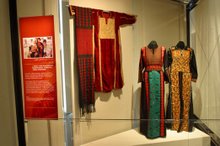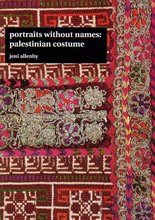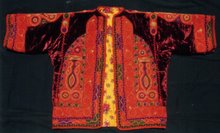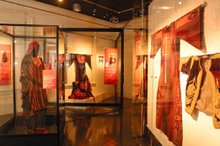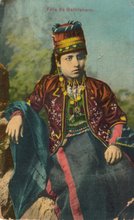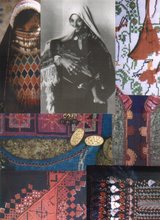 |
| Source |
Meet Um Hikmat Khaled.
 |
| Source |
Bee keeper. Baker. Independent farmer. Wearer of stunning contemporary Palestinian dresses. Palestine Fair Trade Association board member. Canaan Fair Trade Deir Ballout women’s Cooperative member. Um Hikmat is a woman who gets things done.
 |
| Source |
Um Hikmat lives in Deir Ballout / Ballut (Arabic: دير بلّوط), a Palestinian village located in the Salfit Governorate in the northern West Bank, forty five kms south west of Nablus. According to POICA, this location:
"makes it one of the frontline villages in the governorate as it is situated on the Green Line. The population of the villages is about 3,500 according to 2005 estimates. There are a number of clans in the village including the clans of AbduIlah, Odeh, Musa, Qasem, Mustafa and Sabra, in addition to a number of smaller refugee clans (constituting about 12% of the village’s population.)
"The total area of the village is about 13.941 dunums, 10.000 dunums of which are located in the plains and is used to grow winter and summer crops. The built up area of the village is about 809 dumus and the remaining lands are used as range land and are located in the west of the village close to the Green Line, while the remaining area is planted with olive orchards mostly separated behind the Wall. The available data indicates that the village has lost more than 17,000 dunums of its fertile agricultural lands during the 1948 war."
Canaan Free Trade confirms that currently:
"Out of a population of 4200 people, 80% depend on agriculture with over 15000 dunums dedicated to olive trees and stone fruits, and 3000 dunums used to plant winter crops such as wheat, lentils, barley, and rain-fed vegetables"
Palestinian farmers face a lot of unique problems as well as the usual every day ones every farmer faces. The result has been that many now work with organizations like the Palestine Fair Trade Association (PFTA):
"the largest fair trade producers' union in Palestine, with over 1700 small Palestinian farmers joined in fair trade collectives and cooperatives across the country. Collectively our farmers produce the traditional olive oil and food delicacies from Palestine, and sell them internationally to buyers and markets not available to an individual farmer.
"Fair trade means social and economic empowerment – a dignified living for farmers who have not had access to the outside world for over 40 years. We revitalize farming traditions and a culture of sustainability by linking the traditionally organic farming methods of Palestine to modern organic/ecological movements and markets."
Deir Ballout is one of the villages that works with Canaan Free Trade, who's mission is "to benefit the farming communities of Palestine":
"Before we began, farmers here were selling their olive oil for 23% less than it costs them to harvest it (8 sheckels per kilo). Now, that we're able to sell our oil around the world, our growers are earning 22 sheckels per kilo, enabling us to earn a living from the farm crafts our families have practiced for generations. Our motto is "Insisting On Life".
"Canaan is rare among Fair Trade cooperatives in that we do more than simply export raw goods for finishing and marketing by other companies. We also manage all our processing, packaging and branding.
 |
| Source |
"We provide finished, ready-to-sell "Product of Palestine" premium food items. This of course means more economic opportunities for the people of Palestine, but it also allows us to protect the authenticity, integrity and quality of everything that we do"
Canaan Free Trade have been achieving great things for Palestinian farmers for a while now. And we can vouch that indeed their products are of the highest "authenticity, integrity and quality". We know. We've bought them and scoffed them :). Canaan Free Trade's website states:
"Deir Ballout is also the home of Palestine Fair Tradeʼs 20-member olive cooperative that produces around 50 tons of olive oil annually, as well as the highly organized womens cooperative whose members produce about 10 tons of Canaan Fair Tradeʼs delicious Maftoul."
Which brings us back to Um Hikmat, who we met at the top of this post, who has a lot to do with those local women's cooperatives.
 |
| Source |
As many Palestine Costume Archive friends know, we've worked with Palestinian women's cooperatives since the 1980s. We were able to offer use advice and some funding for some cooperatives with embroidery programs as well as assist with international markets. It was an extraordinary experience for us because in many cases there were hardly any men left in the village. Canaan Free Trade encountered something similar in Deir Ballout:
"This village ... embodies a unique kind of beauty and hard working spirit [with] women are the primary actors in the agricultural field ... While women in Dier Ballout are proud of their leadership role in the community, most of them say that they suffer from having to carry the brunt of a conflict that has left most of the men in the village no choice but to work in difficult jobs in Israeli settlement sweatshops as carpenters and textile workers. According to Um Hikmat, “agricultural work is good but it is not enough to sustain a modern day family with all the demands in life. Men do what they can to support their families. Many even work in settlements that have taken up their own lands because factory work gives them some income. Not a good income but an income nonetheless.”
"There is, without a doubt, an unsettling feeling as you come into Deir Ballout surrounded by 3 major Israeli settlements that engulf the small village. This is why Um Hikmat says the work of the Palestine Fair Trade Association, of which she is an active member, has been very important in the village. “With fair prices for our olive oil more people are starting to go back to the land because when Canaan Fair Trade came the revenue from olive oil got better. So many leave the textile work in the factories during the harvest season and they work in their land. It is a short month and it is tiring but it gives good yield that allows breathing space for people.”
These cooperatives now produce a wide range of traditional Palestinian handmade products. Canaan Free Trade is trying to help establish a world market for these products:
"Fair trade women's cooperatives have introduced many traditional Palestinian handmade products to the world market – couscous, za'atar and olive oil soap among them. These products give women an opportunity to earn income and empower them as they gain experience and skills in management, problem-solving, and cooperative relationships. Economic success has led to greater self-confidence, greater civic participation, and greater influence for many women. "
"Our women's cooperatives have evolved from single item cooperatives to year round businesses. Now village cooperatives are creating their own women's centers, where the women will own the center, making their business sustainable and viable and giving each member a share in the land and the profit. Deir Ballout village, our most advanced women's cooperative, is building now..."
In a quote above Canaan Fair Trade mentioned their "delicious Maftoul". If you are not familiar with Maftoul, you can see it's small, round, pasta-like granules made from semolina and wheat flour in the Canaan Fair Trade product photo below.
 |
| Source |
Maftoul provides a classic example of Israeli cultural appropriation. It's absolutely fascinating to read on Wiki's Israeli couscous page, under it's Hebrew title Ptitim, how the product was:
"invented during the austerity period in Israel (from 1949 to 1959), when rice was scarce, to provide for the needs of the Mizrahi immigrants, for whom rice was a dietary staple"
And how:
"Israel's first prime minister, David Ben-Gurion, asked Eugen Proper, one of the founders of the Osem food company, to quickly devise a wheat-based substitute to rice. The company ... developed ptitim, which is made of hard wheat flour and roasted in an oven. The product was instantly a success, after which ptitim made in the shape of small, dense balls (which the company termed "couscous") was added to the original rice-shaped ptitim"
Right down the bottom you'll read:
"Pearl-shaped ptitim are somewhat similar to the Levantine pearled couscous known as maftoul or mograbieh in Lebanon"
Amazing how one sentence can conceal so much! At least now you can find more truthful histories of "Israeli couscous" online, like this one from CookThink.com:
"Like couscous, so-called Israeli couscous are small, round, pasta-like granules made from semolina and wheat flour. While the Israeli company Osem claims to have "invented" Israeli couscous in the 1950s, it is simply a marketing term for what was known previously as North African berkukes or Palestinian matfoul and popular in Jordan, Syria and Lebanon.
"Unlike familiar small, yellow semolina-based North African couscous, Israeli couscous (which is sometimes called pearl couscous) is twice as big and is toasted rather than dried. This gives it a nutty flavor and a sturdy composition that gives it a chewy bite and makes it stand up to sauce. Israeli couscous can be used in salads, soups or as a base for chicken or fish. It works well when prepared like a rice pilaf"
Maftoul has become a popular Palestinian export and one of the Deir Ballout women's cooperative's most popular products. On the Canaan Fair Trade website Um Hikmat calls her co-op's version:
"the best Maftoul in Palestine! Made from organic wheat and rolled with her own hands she says, “We may not have technological advancements in our village but we can do things with our hands that are superior to anything made by machines. No machine can make this kind of Maftoul. It does not work.”"
"Working with several women in her coop to improve their economical condition, Um Hikmat holds a bigger vision for the work that they are doing. She puts aside any personal differences to keep pressing forward with the hope that one day the work her coop does will speak to the world’s ears and break down what she refers to as cultural misunderstandings. “We want our work to communicate to people around the world that we are beautiful and strong women contrary to how we are often portrayed.”
We'd love to meet Um Hikmat sometime. Okay so we are biased and we want to ask her about the wonderful traditional dresses she wears. But seriously, she's achieving lots of great things, as Canaan Fair Trade point out:
"Um Hikmat has been becoming more and more involved in connecting women from different villages together in order to learn from each other ways to improve their lives. While many women find themselves in a position where their husbands cannot find work due to closures and a challenging economy, Um Hikmat says, “We have to find ways to support ourselves creatively. This is why we are now expanding our work to include more handcrafts and artwork. It is important to show young girls that they are not prisoners to their circumstances and that with hard work and determination, they may not be able to change the whole situation, but they can become more in control of their lives.”
"But mere survival is not Um Hikmat’s goal. This is why she is excited about the role Fair Trade has played in their coop.“Since we started making Maftoul for Canaan Fair Trade we have been enjoying the company of each other more. We love life. We want to enjoy it to the fullest; this is why we don’t work alone. Maftoul is a great excuse to get together, cook together, and work together We roll, we chat, and we feel good when we are finished that we accomplished something as a group. These are the beautiful things in life.”
Canaan Fair Trade elaborates on the co-op's influence on another page of their website:
"the excellence of the work of the women in this community has also made a noteworthy contribution to Canaan Fair Trade and other women cooperatives in northern villages.
"As one of the best Maftoul making cooperatives women in Deir Ballout have helped conduct several Maftoul rolling trainings inviting other cooperative members to come and learn their methods"
From all this we are sure you will agree it's become pretty clear that the Deir Ballout women's cooperative desperately need a base of operations for all their activities, from creating their products to holding training programs for others.
 |
| Source |
Which is where this old house comes into the picture.
It's a lovely example of traditional Palestinian architecture.
Which is why the Riwaq Center for Architectural Conservation is interested in it. We are sure you've heard about Riwaq's work. We hold tremendous respect for them - basically our mission statement's are very similar, just replace architectural heritage with cultural heritage. But they've achieved so much, we are just in awe :)
Have a look at their incredible 50 Villages Project:
Canaan Fair Trade has posted on the Facebook page that contained these photos that:
Meanwhile - never ones to sit on their backsides - Um Hikmat and other co-op members have moved in with brooms to start cleaning the space.
We're sure next time you're in the region Um Hikmat and her colleagues would love to show you around the co-op's new premises :)
 |
| Source |
 |
| Source |
 |
| Source |
Which is why the Riwaq Center for Architectural Conservation is interested in it. We are sure you've heard about Riwaq's work. We hold tremendous respect for them - basically our mission statement's are very similar, just replace architectural heritage with cultural heritage. But they've achieved so much, we are just in awe :)
"Riwaq’s mission is the protection of the Palestinian architectural heritage. The center’s activities started with research and documentation in 1991 and developed into more concrete conservation and planning projects. By 1998, the center operated in five main areas, these are:
- Conservation of historic buildings
- Rehabilitation and development of historic centers
- Research and publications
- Community awareness
- Documenting and archiving information about all historic building in the West Bank and Gaza.
"By 2006, Riwaq had become the leading organization in architectural conservation in Palestine, and has been able to achieve many of its planned objectives. A Register of 50,320 historic buildings was compiled over the course of 10 years and published, more than 50 conservation projects were implemented and more than 16 protection plans for historic villages were prepared. These achievements are just examples of what Riwaq was able to accomplish over the years, for more information please visit Riwaq’s website (www.riwaq.org). "
 |
| Source |
Have a look at their incredible 50 Villages Project:
"Following the completion in 2007 of Riwaq’s comprehensive architectural survey, which resulted in the publication of ‘Riwaq’s Registry of Historic Buildings’, it was revealed that almost 50% of the historic buildings in rural areas of the West Bank and Gaza are located in around 50 villages. Hence it has become Riwaq’s vision to focus on those 50 villages for the foreseeable future, working on rehabilitation projects to target improvement of services, infrastructure and living conditions of the public, private and surrounding spaces.
"The 50 Villages Project is not only seen as resulting in the protection of 50% of the Palestinian architectural heritage, but also as a tool for socioeconomic development, generating employment opportunities in the village, disseminating traditional building knowledge and, most importantly, revitalizing the historic center and reinstating it as part of daily life.
"One of the most important elements is to get the inhabitants and owners of properties in the historic centers interested and involved in rehabilitation, which can only happen with the involvement of the municipal or village council, local NGOs and individuals with authority and influence in the local community..."More here.
 |
| Source |
The great thing is Riwaq has kindly agreed to renovate this house so the co-op can use it.
Here they are measuring everything.
 |
| Source |
Canaan Fair Trade has posted on the Facebook page that contained these photos that:
"Upon agreement, Riwaq will cover 90% of the conservation expenses, and the women have to cover the 10% left, which equals to around $5000US.
"If you are interested, or know anyone who would be interested to contribute to cover the renovation expenses, please let us know! Every penny is greatly appreciated."
 |
| Source |
Meanwhile - never ones to sit on their backsides - Um Hikmat and other co-op members have moved in with brooms to start cleaning the space.
 |
| Source |
 |
| Source |
There is just something about this co-op that really makes us want to help. Perhaps it's because of Um Hikmat's great determination and achievements. Perhaps it's because they are so close to achieving their goal here. Perhaps it's because they make amazing Maftoul.
Anyway, here we are, letting Archive friends know via our mailing list, doing the ask around thing of all Archive volunteers, and here finally via this very long post on our staff blog. Well you know us, we're into the education thing - and think how much you've learned today reading this!
 |
| Source |
In everything we've said today this is the most important part:
If you can help drop Canaan Fair Trade a line on Facebook with your email address and they'll send donation details.
 |
| Source |
We're sure next time you're in the region Um Hikmat and her colleagues would love to show you around the co-op's new premises :)
More info:
- Canaan Fair Trade website - Um Hikmat page
- Wiki - Deir Ballut
- POICA - Deir Ballout
- Canaan Fair Trade website - Deir Ballout page
- Palestine Fair Trade Association
- Wiki - Ptitim
- CookThink.com - Israeli couscous
- RIWAQ
- RIWAQ - 50 Village Project
- RIWAQ on Facebook
- Canaan Fair Trade on Facebook
- Canaan Fair Trade - online shop
- if you can help drop Canaan Fair Trade a line on Facebook with your email address and they'll send donation details
Photos: courtesy Canaan Fair Trade on Facebook - photographer unknown












